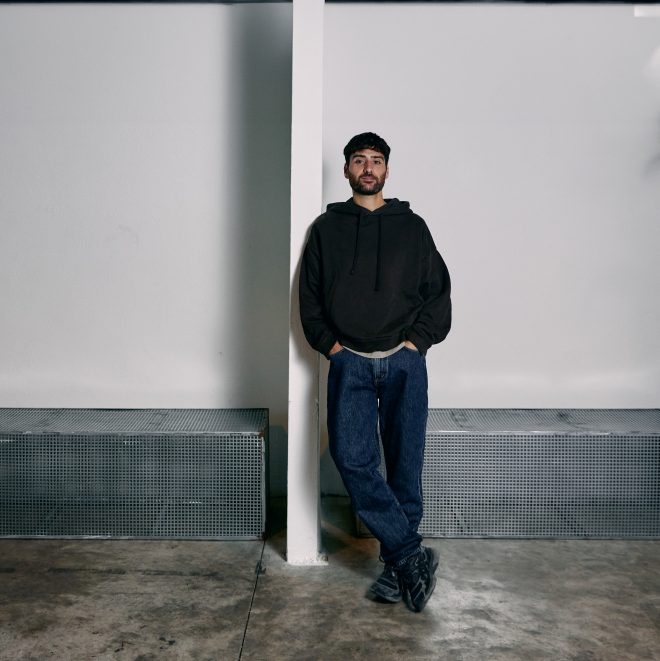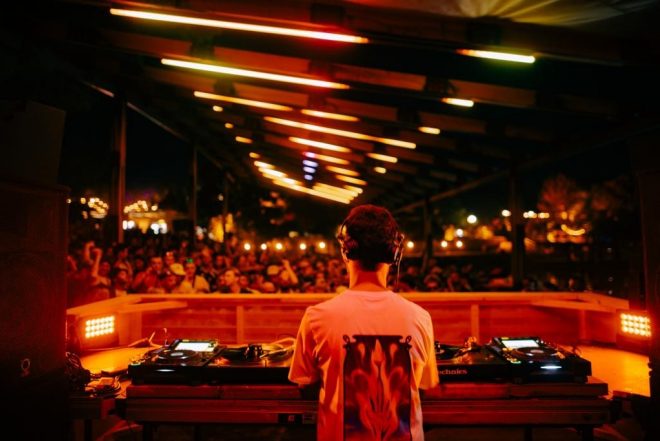Gabbs
Journey from the Basement to the Main Stage

Gabbs, a DJ known for his eclectic style and unwavering dedication, opens up about the influences that shaped his artistry, his views on the evolving club culture, and the path that led him from experimenting with his father’s old vinyl to becoming a key figure in the underground scene. Through his answers, Gabbs shares his deep-rooted connection to music, his relentless search for unique tracks, and a vision for the future that emphasizes authenticity in an industry that’s rapidly evolving.
Beginnings in Music
Gabbs’ journey began at a young age, sparked by a serendipitous discovery in his basement.
“The first time I saw a DJ console, I was 10 years old,” he recalls.
It belonged to his father, a former DJ, and young Gabbs was immediately captivated.
“I was immediately drawn to those tools, and I immediately tried to use them, managing to get them working after three days,” he explains.
This early exposure to equipment—and Italo-disco vinyl—planted the seed of his musical passion. His fascination turned to ambition at a summer camp party where he played for the crowd using DVD players and compilation CDs.
“I managed to get everyone dancing. It gave me such a boost,” he says, describing the thrill of that moment.
Growing up in a small town further fueled his curiosity. Without access to the city’s vibrant music scene, Gabbs would travel to hear iconic DJs and experience club culture firsthand. Moving to Rome in 2015 to attend university marked a new chapter, as he co-founded Jooice with his girlfriend and friends.
“Thanks to Jooice, I started playing more often outside of Italy as well” Gabbs notes.
This collective effort became the launchpad for his professional career.
A hallmark of Gabbs’ career is his unyielding quest for unique tracks, a process he describes with reverence.
“The continuous search for music is a fundamental part of a DJ's work,” he reflects.
Gabbs often dedicates full days to crate-digging, frequent record stores, and private sellers. A memorable discovery happened in Detroit:
“I remember digging all day without finding anything particularly special, but in the end, just 10 minutes before the store closed, I found a record that became a huge success and very important for me,” he says.
His emotional attachment to each track, the stories behind them, and the places where he’s played them reveal his deep connection to his music.

Evolution of the Club Community
Having witnessed the changes in club culture firsthand, Gabbs speaks about the shift from underground roots to a more commercial landscape.
“Music and the music scene have always undergone continuous transformations,” he reflects, noting how accessibility and technology have quickened these changes.
“From my personal experience, I can say that today, compared to when I started going to clubs in 2009, the changes are happening much faster, in line with the changes in our society. Every job has become accessible to everyone; it’s easier to get passionate about something because we have a huge amount of information available.
Like all professions, being a DJ has also become easier and more accessible to all”
“What I think is missing today is curiosity, patience, and sacrifice. Everyone wants to become a big DJ in the fastest way possible. If once you had to be on the dancefloor to listen to music, now, thanks to social media and all the available platforms, we can easily stay at home, watch videos, download music, and aspire to become one of those DJs we see in the videos. With so many channels at our disposal, downloading the latest hits or playing a track, we know will work because we've seen it in an Instagram video, is easier than spending time searching for and finding our sound.”
Today’s aspiring DJs can learn from social media rather than physically experiencing a dance floor, which, according to Gabbs, has led to a more superficial engagement with music.
"In my career, I've been fortunate to do many opening sets, which are technically and musically the most challenging to perform, but at the same time, the best school."
"All of this is also thanks to the presence of smaller clubs, which have been struggling to stay open lately." “The smaller scene, where new DJs can learn and start playing, is increasingly giving way to the mainstream,” he warns.
Gabbs hopes that both worlds can coexist without losing sight of the genre’s origins.
The Takeoff Moment
Gabbs’ “breakthrough” came after the pandemic, when many artists reconsidered their careers. Balancing a full-day job and DJing, he received an invitation to play at Club Der Visionaere in Berlin, a significant milestone in his career.
“I had never played at CDV before,” he explains, adding that it was also his first 4-hour set solo. This set, performed after Slow Life’s Laurine & Cecilio, marked a turning point.
“As soon as I finished the set, I felt incredibly happy, and I immediately knew something had changed, he recalls.
Encouraged by his girlfriend and family, Gabbs decided to leave his job and commit fully to music.
Growth and Musical Philosophy
Despite the changes in his career, Gabbs maintains a consistent musical philosophy, embracing versatility and refusing to be pigeonholed.
“In every set, I always experiment with something different; I don’t like to tie myself to just one genre,” he says, underlining his commitment to evolution.
For Gabbs, each performance is a learning opportunity, a chance to test new ideas while staying true to his unique style. This open-minded approach has defined his sets, making them unpredictable and engaging for his audience.
“My vision has always remained the same. As I started playing more frequently, I only received confirmation of everything I had felt before. I enjoy playing everything, while always keeping my style and flow. I approach each event also like a learning opportunity, striving to improve and do better the next time”.
Future Perspectives and Aspirations
Looking ahead, Gabbs expresses excitement for upcoming gigs, some of which remain under wraps for now.
“Looking back, some of these dates were once just big dreams,” he shares.
On social media’s role in his career, Gabbs is pragmatic, viewing it as a tool rather than a defining factor.
“I don’t think social media are an integral part of an artist's career,” he says, but they are definitely a huge tool that helps us get known and reach a large number of people globally. I still believe that the real integral part of an artist’s career are platforms like SoundCloud and Bandcamp, for example, where the actual music products are uploaded.”
Reflecting on the current state of the scene, Gabbs observes an increasing preference for festivals over clubs, a shift that has changed club culture significantly.
“The rise of numerous festivals is something outstanding that can help to spread our music with more power and try to be more accessible to more people. I love playing at festivals, and I believe they have been very important for my career and a huge inspiration for my future.
Sadly, I note that the club culture is working less than before” he notes, but he remains optimistic that both can grow without eroding electronic music’s roots.
“The audience prefers to attend a festival full of people rather than visit smaller clubs every weekend, which have been struggling lately. I hope that both sectors will grow together, without forgetting the origins of electronic music”.
Finally, Gabbs highlights the importance of connecting with fans, an essential part of his performance philosophy.
“If the crowd responds well, it means you’re doing your job right.”
As a co-founder of Jooice, Gabbs has projects with the record label and event series. Celebrating its ninth birthday in January, Jooice has played a pivotal role in his journey. Gabbs is already planning new releases and aspires to launch his first album soon, although he remains tight-lipped on specifics.
“I’ve recently become a resident at VBX, and there are some exciting projects in the works with them.”
Gabbs’ story is one of passion, persistence, and a refusal to compromise his artistic integrity. Through his dedication to crate-digging, commitment to evolving his sound, and vision for Jooice, Gabbs stands out as a DJ who values authenticity in an industry that often prioritizes the fleeting over the meaningful. His journey from a curious 10-year-old experimenting with his father’s vinyl to a respected name in the underground scene serves as an inspiring reminder that, in Gabbs’ words,
"The most important thing is to make people dance, have fun, and give them a reason to come back to the dancefloor."


